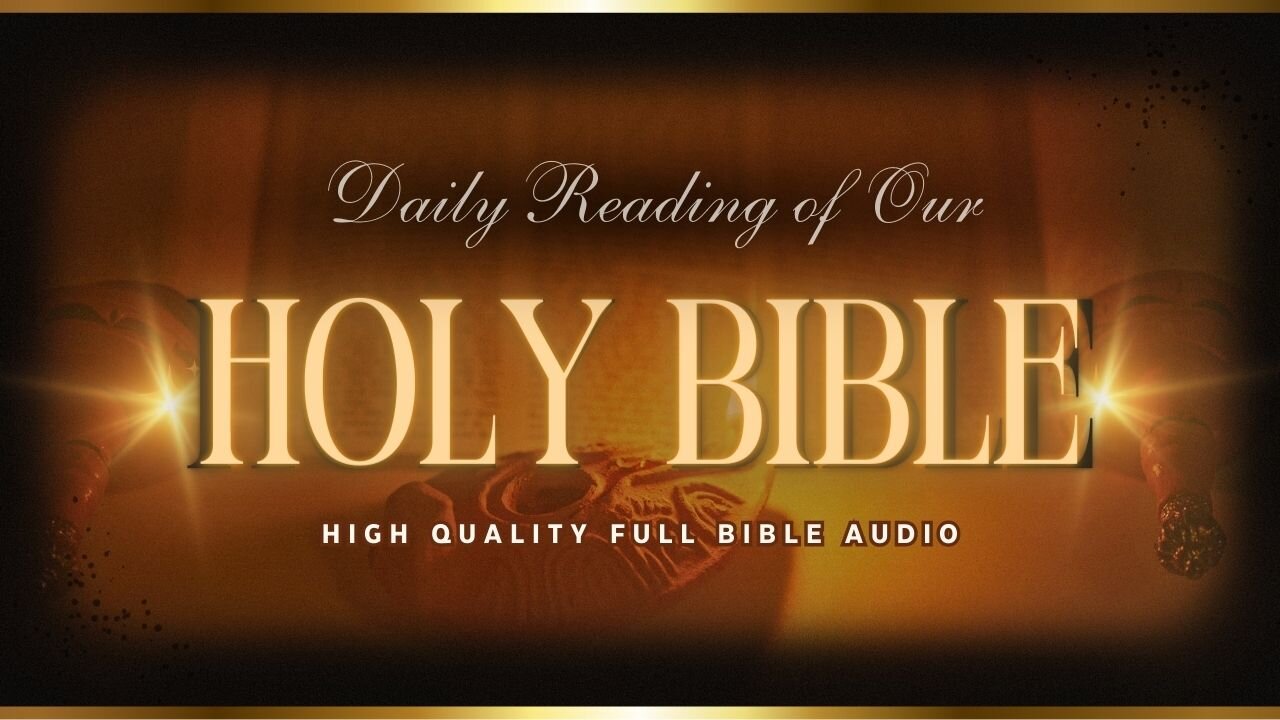Premium Only Content

Genesis 15 Psalm 33:6-17 Proverbs 16:8 17:1 Matthew 15:1-20 John 6:60-71 Bible Reading Plan Audio
Genesis 15:
In this chapter, God reaffirms His covenant with Abram (later known as Abraham) and promises him descendants as numerous as the stars. Abram expresses his concern about not having an heir, and God reassures him that his own son will be his heir. God leads Abram outside and instructs him to look up at the sky and count the stars if he can. God tells Abram that his offspring will be as numerous as the stars. Abram believes God's promise, and God counts it as righteousness for him. God also foretells the future enslavement of Abram's descendants in Egypt but assures him that they will come out with great possessions. God then establishes a covenant with Abram, promising him the land of Canaan as an inheritance.
Psalm 33:6-17:
In this portion of Psalm 33, the psalmist reflects on the creative power and sovereignty of God. They declare that God created the heavens and the earth by His word, and His breath fills the entire universe. The psalmist praises God's character, emphasizing His righteousness, justice, and unfailing love. They affirm that the Lord's plans and purposes stand firm forever, and His eyes are always watching over those who fear Him. The psalmist contrasts the futile efforts of nations and rulers with the salvation and deliverance that come from trusting in God.
Proverbs 16:8:
This proverb highlights the value of having little with righteousness compared to having great wealth obtained through unjust means. It suggests that it is better to have a little with integrity than to acquire riches dishonestly, as the latter will ultimately bring trouble and unrest. The proverb emphasizes the importance of living a righteous and honest life, even if it means having less material wealth.
Proverbs 17:1:
This proverb emphasizes the value of peace and harmony over material abundance. It suggests that a dry piece of bread eaten in peace is better than a feast where there is strife and conflict. The proverb highlights the importance of maintaining healthy relationships and fostering peace and unity, even in times of scarcity or simplicity.
Matthew 15:1-20:
In this passage, the Pharisees and scribes criticize Jesus' disciples for not following the tradition of washing their hands before eating. Jesus responds by rebuking them for their hypocrisy, as they prioritize human traditions over God's commandments. He quotes from Isaiah, saying that they honor God with their lips but their hearts are far from Him. Jesus then explains to the crowd that it is not what goes into a person's mouth that defiles them but what comes out of their mouth, revealing the condition of their heart.
John 6:60-71:
After Jesus teaches about being the bread of life, many of His disciples find His words difficult to accept and question them. Jesus responds, asking if His teachings offend them. He then explains that the words He speaks are spirit and life, and some do not believe because of their lack of faith. Jesus acknowledges that some of His disciples do not believe and reveals that one of them will betray Him. Despite this, Jesus affirms the truth of His teachings and the necessity of believing in Him for eternal life.
-
 LIVE
LIVE
ItsLancOfficial
4 hours agoWE LIVE 🔴WE LIVE 🔴 SUNDAY SUNDAYS!!!!!!! TARKOV
673 watching -
 4:09:32
4:09:32
EricJohnPizzaArtist
6 days agoAwesome Sauce PIZZA ART LIVE Ep. #59: Are You Ready for some FOOTBALL with GameOn!
10.3K7 -
 1:21:43
1:21:43
Jake Shields' Fight Back Podcast
10 hours agoJake Shields and Paul Miller!
43.5K77 -
 1:20:41
1:20:41
TRAGIKxGHOST
1 hour agoTrying to get SCARED tonight! | Are You SCARED!? | Screams Beyond Midnight | Grab a Snack
1.91K -
 LIVE
LIVE
StuffCentral
3 hours agoI'm baaack (no you can't play with me.. unless you a healer)
95 watching -
 2:25:11
2:25:11
TheSaltyCracker
5 hours agoTrump Is Not Dead ReEEeStream 8-31-25
60.8K99 -
 LIVE
LIVE
THOUGHTCAST With Jeff D.
3 hours agoLabor Day Weekend FORTNITE With THOUGHTCAST Jeff & the squad
210 watching -
 3:44:05
3:44:05
Rallied
5 hours ago $0.26 earnedSolo Challenges All Day
34.7K1 -
 LIVE
LIVE
iCheapshot
6 hours ago $0.03 earnedCall of Duty: Black Ops Campaign
32 watching -
 4:39:16
4:39:16
Meisters of Madness
7 hours agoMadness in a Pod
5.18K1